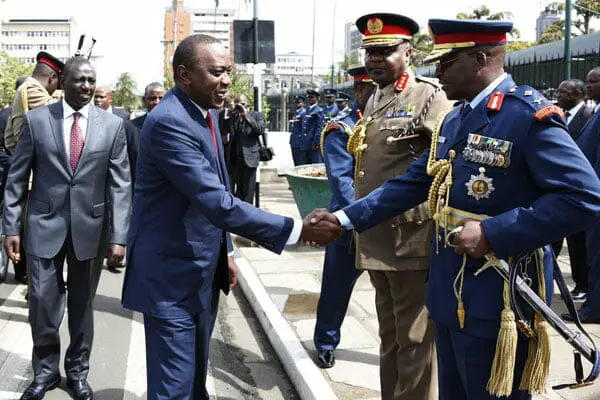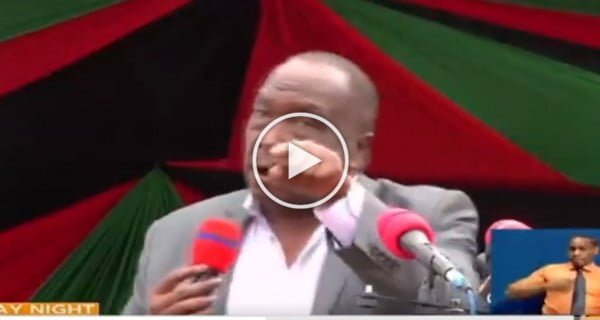Why the Jubilee Mps ganged up to Sink Dr Jumas Nomination
Jubilee Coalition MPs turned against President Uhuru Kenyatta’s nominee for Secretary of Cabinet because of her refusal to spend public funds on political mobilisation, Saturday Nation can reveal.
Jubilee MPs were in the majority when they angrily and noisily rejected the nomination of Dr Monica Juma on Thursday.
Mr Moses Kuria, the Gatundu South MP who had been tasked by the President to rally support for Dr Juma’s nomination, Friday said the reasons for Dr Juma’s rejection “were not in the public interest.”
“We broke world records. We rejected someone for doing their job, for refusing to do things in an unprocedural way,” said Mr Kuria at a press conference at Parliament Buildings in Nairobi.
It is believed that the MPs are used to collecting cash handouts from occupants of the office of the PS Interior and spend it on harambees and other political jobs in their regions.
The money comes from confidential accounts, one of which was isolated by Ababu Namwamba’s disbanded Public Accounts Committee in which the ministry could not account for Sh2.8 billion.
The Interior PS has access to confidential expenditure funds, which are reportedly often spent to fund campaigns and weekend harambees and which Dr Juma would have appeared to refuse to hand out to MPs.
“The truth is that for a long time, the office of the Principal Secretary for Interior has been a cash office for politicians,” said Mr Kuria. The MPs were so settled on the decision that their leaders in the House had given up on Dr Juma’s cause long before the Thursday afternoon sitting.
PREPARED FOR REBELLION
They had also contacted their principal beforehand and prepared him for the rebellion.
Dr Juma also failed to play her cards right and ignored advice from some senior MPs before her vetting.
Come Thursday afternoon and it was evident that the mood in the House was against her, with several Jubilee MPs getting so agitated by Majority Leader Aden Duale’s proposal to extend the vetting period by 10 days that they stood up.
Among the more active ones were: Cornelly Serem (Aldai, URP), Alfred Keter (Nandi Hills, URP), Vincent Musau (Mwala, CCU) and Antony Mutahi (Laikipia East, TNA).
They could also be seen urging their colleagues to resist the Majority Leader’s lobbying and demanding that Speaker Justin Muturi put the matter to the vote without debate.
They eventually had their way, flexing their muscle by first shooting down Mr Duale’s proposal for extension 163-55, prompting Mr Muturi to state there was no point in “trying to extract blood from a rock.”
Of the 163 that voted against Mr Duale’s proposal, at least 107 are from the President’s coalition, with only 14 voting with those who wanted the extension of the vetting period.
When the Security committee tabled its report on Wednesday afternoon, Mr Duale and Mr Kuria and others started lobbying support to overturn the recommendation.
By the end of the day, none had reported any significant progress.
It is understood that the House leaders had already contacted the President before the sitting began and told him that it had virtually impossible to get MPs to change their minds.
At the end, Mr Duale and Mr Kuria were left looking lonely as they sat together at the front on the Jubilee side, with their troops behind them leading a sort of revolt.
The Administration and National Security Committee used the excuse of Dr Juma’s letter written to Parliament to caution about frequent visits to her office by MPs to say “she lacked a practical approach in dealing with the public and elected representatives.”
It is during these visits to the Interior PS’s office that the cash is handed out.
The plotting against Dr Juma had started during a Jubilee retreat in Naivasha, long before Thursday’s vote. In the retreat at the Great Rift Valley Lodge, the Jubilee Coalition Parliamentary Group discussed the letter and threatened to act against her.
Ahead of her vetting, MPs familiar with the matter told Saturday Nation that Dr Juma had been advised to either deny the existence of the letter, downplay it or give a cleverly worded explanation about it.
But when she was asked about it, Dr Juma retrieved it from among her documents, read it and explained why she had written it.
Nation


















































